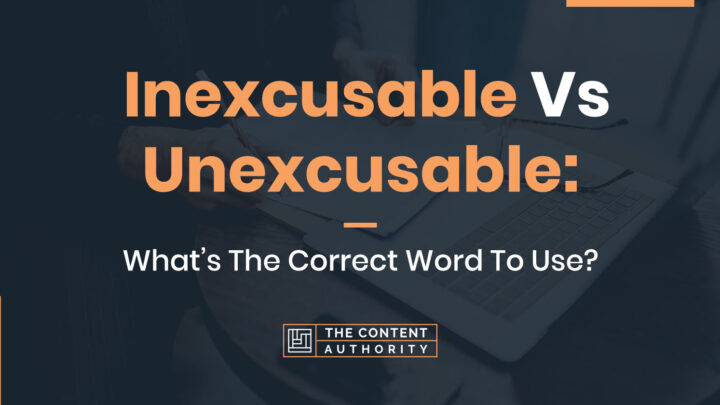Are you looking for a word to describe something, like a behavior, that you cannot justify or excuse? You are probably thinking of these two terms: inexcusable and unexcusable. These two words are confusing because they are assumed to imply the same thing, but is this true?
Inexcusable is the opposite of “excuse.” It implies something you can’t excuse or justify. An excuse means “to make allowance for, overlook, or pardon.” So, inexcusable applies when an offense happens. Some use unexcusable as an alternative to inexcusable; unexcusable is not recognized in modern English.
In English, adding the prefix “un” or “in” before a word, especially an adjective, negates it. However, some words take the prefix “un” while others take “in.” Read on to learn which prefix the word excusable takes and a little more about these words’ meanings and their differences.

Definitions Of Inexcusable And Unexcusable
The words inexcusable and unexcusable come from the verb excuse and the adverb excusable. So, let us begin this section by defining the words excuse and excusable. The word excuse means “to make an allowance or overlook a possibly offensive act.” Let’s look at an example in a sentence: “The parents always excuse their children’s behavior for trauma.”
In other contexts, this word means “to permit to leave or release.” For example, in a sentence, “The teacher will excuse the students from the class after they complete the assignment.”
In another context, the word excuse means “to apologize for a possibly offensive act.” For example, in a sentence, “The teacher did not accept her excuse for being late.” As a noun, excuse means “an explanation offered to justify or obtain forgiveness.” An example in a sentence is, “Martina uses the same excuse for her tardiness every day.”
So, the word excusable is an adjective for “excuse.” It means “possible to excuse” or “an act that you can excuse.” An example in a sentence is, “While her actions are excusable, the teacher will still punish her.”
With an understanding of the definitions of “excuse” and “excusable,” we can comfortably get into the meanings. We scoured online and offline sources to prepare the following definitions of the words inexcusable and unexcusable.
Definition Of Inexcusable
Inexcusable is an adjective for “excuse” and the opposite of “excusable.” So, it means “something you cannot excuse.” Simply put, an action that is not excusable. An example sentence is, “Jane’s impolite behavior towards her peers is inexcusable.”
In another context, the word inexcusable means “something you cannot overlook or forgive.” For example, in a sentence, “Her classmates found her constant tardiness inexcusable.”
Other sources define the word inexcusable as “an unacceptable behavior for which no explanation or justification is accepted.” For example, in a sentence, “Her witty talk to explain her bad behavior is inexcusable.”
Definition Of Unexcusable
Some sources define “unexcusable” as an alternative or synonym for “inexcusable.” This implies that they share the same meaning. So, you can apply the definitions above for this word too. However, most prominent sources do not recognize “unexcusable” as an English word; the term does not appear in major dictionaries.
How To Properly Use Inexcusable And Unexcusable In A Sentence
Inexcusable is the correct and most popular word compared to unexcusable. Therefore, you should be keener on how to use it in sentences. However, it also would not hurt to learn a thing or two about the use of the word unexcusable in sentences. Here are some practical guidelines.
How To Use The Word Inexcusable
Use this word as an adjective to refer to “something, a behavior, or an act without excuse.” Always remember the definition when determining the contexts in which to apply words.
This word is an adjective. So, its purpose is to describe a verb so readers can imagine situations, characters, and settings. That said, apply the following guidelines when using this adjective in a sentence. Let us start with the sentence structure:
- Place the adjective after a subject. For example, “Jane’s behavior is inexcusable.” The subject in this sentence is “Jane’s behavior.”
- Place the adjective after a subject and verb but before a noun. For example, “This is an incredibly inexcusable act.”
Note: You should never place an adjective after a noun. For example:
- “It is inexcusable Jane’s behavior.” (INCORRECT)
- “Jane’s behavior is inexcusable.” (CORRECT)
How To Use The Word Inexcusable
Some people take “unexcusable” the same way as the word inexcusable. That means they assume the word has the same meaning as “inexcusable.” Being an adjective, they apply the guidelines above when using the word in sentences. However, we would discourage you from using this word in sentences as most sources do not recognize it as a correct English word.
More Word Usage Posts
Inexcusable Vs. Unexcusable: Why You Should Use The Correct Word
The correct word between these two is “inexcusable.” Therefore, you should only use it in sentences. Using an incorrect term in writing or verbal conversations will make you sound wrong.
Additionally, it may alter your sentence’s meaning. This is especially the case when dealing with words with separate meanings from what you intend.
Using the correct word also means using the proper spelling while writing. However, while speaking, you must also use the correct pronunciation, so the listener understands you correctly. So, the proper pronunciation of inexcusable is “/in-ik-skyoo-suh-buh/.” You can break the word into syllables if you have trouble mastering its pronunciation. This word has five syllables, “in-ex-cus-a-ble.”
Why Is “Unexcusable” Incorrect?
The prefix “un” shares the same meaning as “in.” These word-forming elements mean “not, opposite, without.” They also share meaning with the prefixes “im, il, and ir.” However, even though they have the same definition, they do not apply to all words equally.
For instance, you cannot say imexcusable, unexcusable, irrexcusable, or ilexcusable. Instead, you can say irreplaceable is the opposite of replaceable, impassable is the opposite of passable, and illiterate is the opposite of literate. So, in the case of “excusable,” the correct prefix is “in,” not “un.”

List Of Examples Of Inexcusable And Unexcusable Use In Sentences
You now know that the word unexcusable is incorrect, and you should avoid it in sentences. This section looks at examples of sentences with both words. The examples of the word “inexcusable” in sentences will show you how you can use this word to construct your sentences. In contrast, the second section will show how people misuse the word unexcusable in sentences. Here are the sentences:
Example sentences of inexcusable
- Jane’s behavior towards her brother is inexcusable.
- The lecturer asked Jannah to leave the classroom after determining that his failure to finish the assignment was inexcusable.
- Mr. Jones will not permit that behavior in his classroom because he finds it inexcusable.
- The court found Anita’s failure to meet her parole conditions inexcusable.
- The judge found the company’s lack of accountability for the poor working conditions inexcusable.
Example sentences of unexcusable
- Juana’s unexcusable lateness lost her the promotion. (Incorrect)
- The situation was unexcusable and disgusting. (Incorrect)
- Sandra’s impatience is unexcusable. (Incorrect)
- This is the most unexcusable thing Ginny has done. (Incorrect)
- Hanna’s emotional outburst is unexcusable. (Incorrect)
Conclusion
While English is one of the easiest languages in the world, it can also be incredibly confusing, especially when looking at word-forming elements and characteristics. For instance, there isn’t a clear and convincing explanation for why unexcusable is the incorrect opposite of excusable, but unavailable is the correct opposite of available.
For this reason, most people have difficulty telling such words apart. However, we are committed to clarifying confusing English words. Go through other words we have detailed, and you’ll be happy to encounter some amazing words.
Shawn Manaher is the founder and CEO of The Content Authority. He’s one part content manager, one part writing ninja organizer, and two parts leader of top content creators. You don’t even want to know what he calls pancakes.

